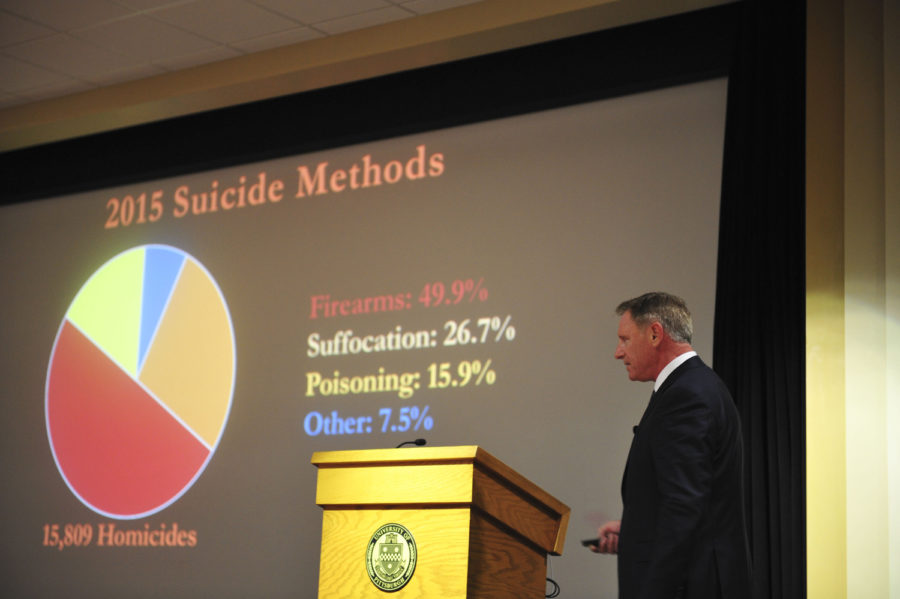Kevin Briggs thinks his unofficial title — “guardian of the Golden Gate Bridge” — sounds “egotistical.”
“I’m not a big fan of the name,” Briggs said in an email. “I think there are many ‘Guardians’ all over the world, both first responder and citizen.”
Briggs, a California Highway Patrol officer and suicide and mental health awareness advocate, spoke in the William Pitt Union Ballroom Monday night about his experience preventing more than 200 individuals from jumping off the Golden Gate Bridge into San Francisco Bay during his 23 years as a CHP officer. More than 100 people attended the event hosted by Pitt’s chapter of Active Minds.
Briggs said he’s seen three common traits in people he has saved during his time patrolling the bridge — mental illness, a refusal to take medication and the belief they’re a burden to those around them.
“They’re suffering so bad they can’t see the future, they just want their pain to end,” he said.
Briggs instructed the audience on what to do if they encounter a suicidal individual attempting to jump off a high structure.
“[I] stay 10 feet back and introduce myself and say, ‘Hey I’m Kevin, could I talk to you for a bit?’” Briggs said.
Briggs’ work has led him to become an advocate for suicide prevention. He criticized the stigma surrounding mental health, saying people need to be more open to talking about it. Briggs himself suffers from depression and said he didn’t know what to do about it at first.
“Being a man and these jobs that I’ve had … you know, these macho jobs and the army. We don’t talk about our feelings, typical guy thing — we don’t do that,” Briggs said.
Suicide is the second leading cause of death among college-age students, according to a 2013 study published in the Journal of College Student Psychotherapy. Briggs said seeing young people on the bridge will “hit you harder.”
“It’s just such a shame to see a life thrown away so early, you know, when they’re a teenager or something,” Briggs said.
Kwai Lin Kennedy, president of Pitt Active Minds, said people should attend talks given by people like Briggs to learn how to help family and friends who are suffering from mental illness. Kennedy said Briggs’ focus on active listening is important in helping people suffering from mental illness.
“I think that’s really important,” she said. “A lot of people ask us, ‘What do we do if we know that a friend is struggling?’”
An important intervention technique Briggs learned is the 80/20 rule — listening 80 percent and talking 20 percent of the time. When you do talk, he said, you should tell suicidal people that many survivors believe it was a mistake. And ask about their plans for tomorrow, he advised.
“They want you to be there for them,” Briggs said.
First-year communications major Victoria Pizzuto said listening to Briggs’ experiences and advice gave her “faith in humanity.”
“I decided to come because I think mental health is really important; especially beginning college it’s been really stressful and I feel like when I come to these things I get in a better mood and get a better outlook,” Pizzuto said.
First-year psychology major Connor Olson struggles with anxiety. He found it inspiring to listen to another man talk about the stigma around mental illness and how to approach it.
“It seems like he’s the kind of guy maybe when you first meet him you feel he’s very direct, he’s very firm, he’s a police officer,” Olson said. “But he seems he has that side where working with these people has started to open him up a little bit more to new ideas and being open to different things.”
Though he’s saved hundreds, not all of Briggs’ encounters on the Golden Gate Bridge have ended as he hoped. Briggs said he’s always hard on himself when a person he’s established a bond with on the bridge ends up jumping.
“I think a piece of me dies with them. I tell myself, ‘What could I have done better?’” Briggs said. “If you’re in this business, you are more than likely gonna lose some folks, but does that mean I’m not gonna try my hardest each and every time?”
Briggs said he has three words he wanted the Pitt community to take away from his talk — “listen to understand.”



